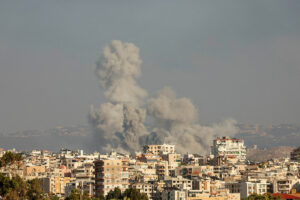By Kyle Aristophere T. Atienza, Reporter
THE PHILIPPINE government on Thursday said it was preparing chartered flights to bring home Filipinos from war-torn Lebanon, as it announced a ban on the deployment of workers there.
There were 101 Filipinos in Lebanon who were ready to be repatriated, but the “challenge is that we do not have flights,” Migrant Workers Undersecretary Bernard Olalia told a news briefing.
He said the government was supposed to bring home 15 Filipinos from the Middle Eastern country on Sept. 25, but it did not push through because the flights were canceled due to the conflict.
“And as a consequence, we are trying to provide chartered flights.”
Mr. Olalia said three more shelters have been secured in Beirut in case more Filipinos signify their intention to leave. He added that the Philippines was having a hard time securing landing rights for chartered flights.
“The other challenge is the exit permits of some of our workers,” he said. “Apart from documented overseas Filipino workers (OFWs), we have undocumented OFWs who need to secure travel documents.”
“And once they are given travel documents, we will help them in securing exit visas or exit permits from the immigration [office] of the Lebanese government.”
Mr. Olalia said the Department of Migrant Workers is studying the possibility of using alternative routes. “Apart from the air route, we will be assessing the sea and the land route should the case or the situation there worsen.”
He said the Philippine government would no longer allow the deployment of OFWs to Lebanon because the Department of Foreign Affairs (DFA) had raised the alert level to 3.
“When Alert Level 3 is imposed, there is a voluntary repatriation, and under this stage, we no longer allow either direct hire or a returning worker to go back there.”
The DFA earlier said it might declare Alert Level 4 in the war-torn country, whose southern part was invaded by Israel to contain the armed group Hezbollah, which had a month-long war with Israel in 2006.
The tension is the latest in a spate of cross-border hostilities after Israel’s bombardment of Gaza.
In a statement earlier this week, the Israeli military said its troops backed by aircraft and artillery had begun “limited, localized and targeted raids against Hezbollah terror targets,” accusing them of posing “immediate threat” to northern Israeli communities.
Hezbollah spokesman Mohammed Afif on Tuesday said there had been “no direct ground clashes” with Israeli forces, denying that they had crossed into southern Lebanon, based on a Reuters report.
The group was “ready for a direct confrontation with the enemy forces that dare or attempt to enter Lebanese territory and to inflict the greatest losses on them.”
The Philippines last month joined 123 other countries in favoring a United Nations resolution urging Israel to end its occupation of Palestinian territories within a year.
Israeli settlement activities involved the transfer of its nationals “into the occupied territories, the confiscation of land, the forced transfer of Palestinian civilians, including Bedouin families,” according to the November resolution.
The settlements also involved “the exploitation of natural resources, the fragmentation of territory and other actions against the Palestinian civilian population.”
The Gaza Strip is one of the two territories occupied by Palestinians — the other being the West Bank, which the Israeli government has been trying to invade in recent years.
The two areas, along with East Jerusalem, came under Israeli occupation after the 1967 Arab-Israeli war. Since the war, Israel has responded to Palestinians’ demand for a homeland through military force.
OFWs IN QATAR
Also on Wednesday, Ana Theresia Hontiveros-Baraquel called for measures to better protect the rights and well-being of migrant Filipinos, as she is set to meet distressed OFWs in Qatar who have been victims of abuse and harassment.
In her official trip to the Middle Eastern nation, the senator will meet with at least 50 OFWs who have suffered at the hands of their employers. She will also meet with Philippine diplomatic and labor officials and migrant community leaders to discuss how the Philippine government could ensure the safety of migrant workers, she said in a statement.
Ms. Hontiveros, who heads the Senate committee on women and children, expressed alarm at the acts of physical and emotional abuse, and unfair labor practices perpetrated against Filipino workers in Qatar, particularly domestic workers.
“According to government records, 57% of OFWs deployed in Qatar are household workers, and a majority of them are women who are especially vulnerable to abuse by employers,” she said.
Ms. Hontiveros said migrant workers offices in Qatar and other similarly situated countries should be properly trained to better help distressed Filipino workers, particularly “runaway” workers who are facing threats from their employers.
She also urged the Department of Migrant Workers and DFA to step up their capacity to monitor and reach out to distressed workers.


















